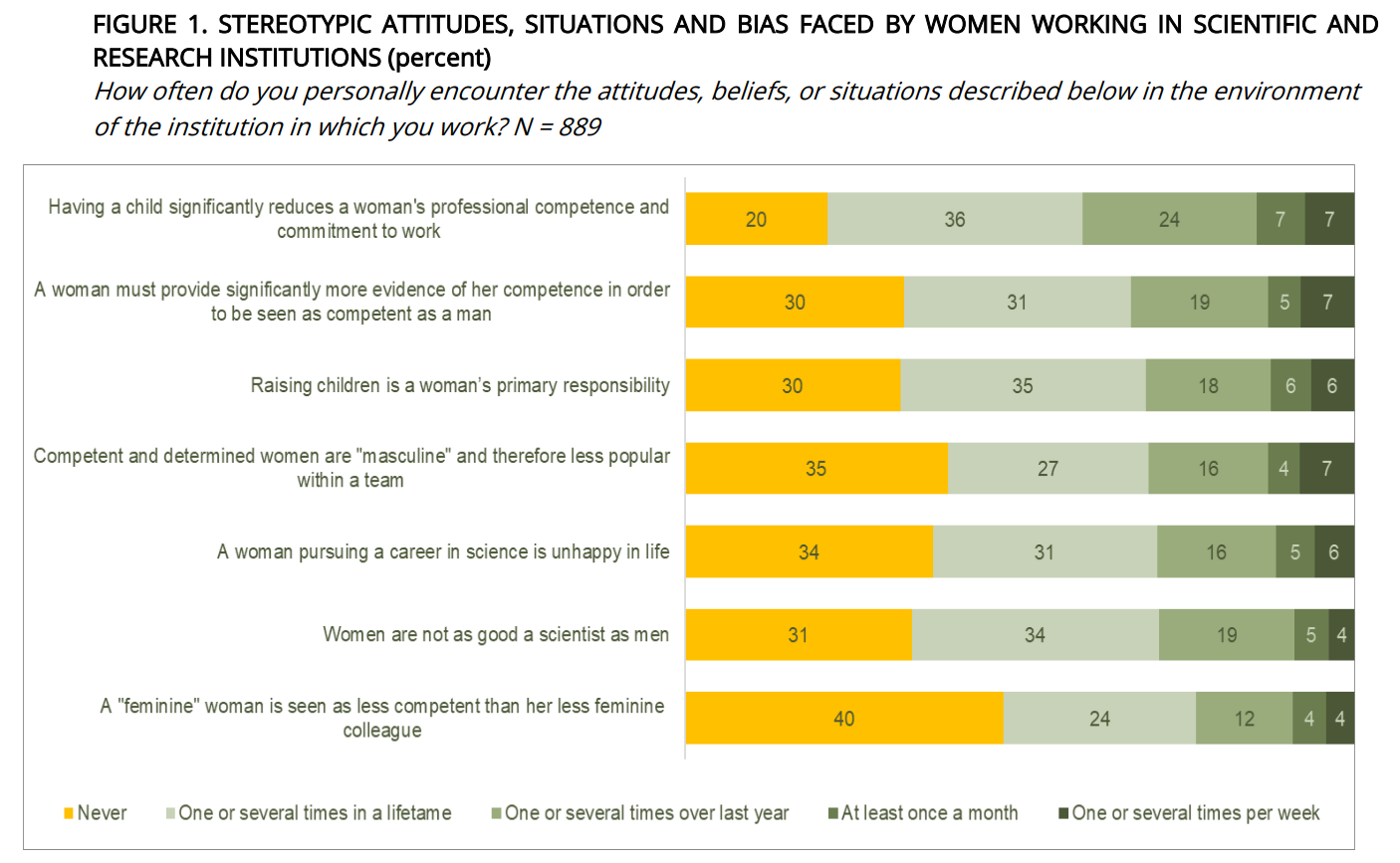Why this study? Introducing the context
Statistics show that women’s careers in the Lithuanian science and study system are still growing much slower than those of men, despite the fact that compared to other countries, the share of women in academic staff in Lithuania is one of the largest. Even though in 2020-2021 women in Lithuanian universities accounted for more than half of the total academic staff, in research and study institutions (RSI), only 34% of board members are women, who earn less on average than men. This image has been exacerbated by the COVID-19 pandemic that has significantly affected the situation of women in RSI.
As a response to the need of finding ways to reduce the impact of the pandemic on women’s career prospects, as well as to identify the best practices and share them, Visionary Analytics have partnered with the Women Leaders Association (liet. Asociacija “Lyderė”), to conduct research on women working at RSI in Lithuania. From April 2021 through February 2022, we launched a survey and conducted a study that has been committed to proposing measures to improve women’s career opportunities in Lithuanian RSI, and their working conditions and achieve gender balance at the highest decision-making levels.
Below we present some of the interesting findings from our research, first covering parts of the survey results and then briefly presenting the recommendations and suggestions that we have outlined concerning ways of moving forward.
What did we find? Survey results
Stereotypes and an environment conducive to gender equality
Stereotypical attitudes are quite widespread in Lithuanian research and science institutions, where 9 out of 10 Lithuanian RSI employees who took part in the survey have encountered some form of stereotypical attitudes and beliefs at least once in their lives. The survey showed that the most common stereotype is a “motherhood wall”, the assumption that having a child significantly reduces a woman’s professional competence and commitment to work.
Women’s leadership and actions that determine their careers
There is no doubt that the results achieved by women in the field of science are vital for their careers in science and research, but whether these results are noticed and women receive enough support and encouragement are no less important aspects. The two factors that have a particularly negative effect on career success are the heavy teaching load and “maternity punishment.”
- A heavy teaching load, which, although not necessarily limited to women, has a particularly negative effect on women’s careers in the social sciences (as many as 42% of respondents in the field identified this factor).
- “Maternity Punishment” for women who are / were on maternity, parental, adoption, or any other type of maternity leave. This is especially true among those who work in the natural sciences (as many as 38%). It is strengthened or reduced by the level of support provided by family members and / or the ability to hire external assistance in caring for children or wards.
The results of our survey showed that whether a woman feels comfortable using her power, the statement to which only 11% of the respondents agreed, affects her desire to be a leader. Women’s self-confidence in science and research is undermined due to the stereotypes such as the perception of competent and determined women as ‘masculine’ (therefore less liked in the team) or the conflation of career-oriented women with being unhappy in their lives.
Gender Equality and sociodemographic characteristic
According to the survey results, the respondents working in the fields of technology, medicine, and natural sciences, as well as in academic positions, encounter stereotypical attitudes and situations more often as compared to those working in arts, social sciences, and humanities as well as in administrative (or academic and administrative) positions. At the same time, age has been identified as a factor to which perceptions of gender (in)equality are related. Younger survey participants notice stereotypical situations and attitudes more ably as compared to the older ones.
Impact of the Covid-19 pandemic
Another noticeable point is that the COVID-19 pandemic has had a negative effect on women’s careers and employment. Respondents were most likely to agree that women had less time to conduct research during the pandemic, while 50% of them agreed more than disagreed that their physical and psychological well-being had deteriorated during the crisis. Though, the picture was not completely gloomy, as almost a quarter of the respondents fully agreed that they had more opportunities to participate in international research activities and an additional third of women agreed that they had more time to write scientific articles. Unfortunately, our results did not show any Lithuanian RSI that had paid exceptional attention to the complexity of a woman’s situation during the pandemic.
Institutional measures to promote gender equality
Out of the list of 35 institutional gender equality measures provided in the survey that can be employed to respond to the challenges women face working in RSI, the participants ranked the following three as being the most relevant (in order of priority):
- Measures to achieve a work-family balance and to facilitate childcare and other caretaking responsibilities.
- Measures to ensure equal opportunities in the working environment.
- Procedures for recruitment, selection, and evaluation that ensure gender equality.
It is important to note that even though the relevance of formal institutional plans, as well as educational measures, can be pertinent for fighting stereotypes in other countries, in our survey they were not ranked as high. Therefore, we believe a significant message to the RSI executives in Lithuania is that formal measures to address current challenges will certainly not be enough.
What should be done? Study recommendations
We believe that in order to ensure gender equality and empower women in science and research, serious structural and non-formal changes need to be implemented that have a practical impact and address the above-outlined challenges effectively. Therefore, we directed our recommendations to the following three factors:
For the Heads of Research and Study Institutions
Based on our research, we have outlined 12 key recommendations and good practices for RSI executives, that, when implemented systematically and consistently, would eliminate stereotypical attitudes and situations, and create favourable work culture. The recommendations range from measures mitigating “Maternity Penalty,” implementing transparent and fair pay criteria, as well as establishing gender balance in governance, to institutional measures aimed towards educating employees about gender equality, among others.
For the Pandemic Challenges Management
Out of the 14 recommendations for the pandemic challenges management that we have outlined, the general topics range from internal institutional communication measures, to work organisation that allows for staff to adjust their schedules, as well as the need to provide a workplace with the necessary facilities for employees. The proactive interest in the phycological health of the employees has also been a key recommendation, among others.
For Policy Decision Makers
Last but not least, we have outlined four substantial recommendations for implementation, whilst noting the disconnect between existing European Commission requirements and national legislation (that apply to RSIs in Lithuania) and their actual implementation in practice. Thus, together with recommendations regarding national policies to ensure gender equality in science and research in Lithuania, as well as measures to address practical challenges related to gender equality, we see the heightened need to ensure preconditions for gender equality by reducing stereotypes in education, for all of which we provide specific recommendations and steps of moving forward.
We hope that this study, which sheds light on stereotypes relevant to various professions as well as contains suggestions on how to better realise the potential of women, will not only be of interest to Lithuanian society in general but also to a wider international community, since empowering women and working towards gender equality are common goals to us all.
To find out more about the results of the study as well as detailed recommendations and steps suggested by us, you can check out the summary of the report in English. You can also learn more about the research in our latest Annual Report 2022.



